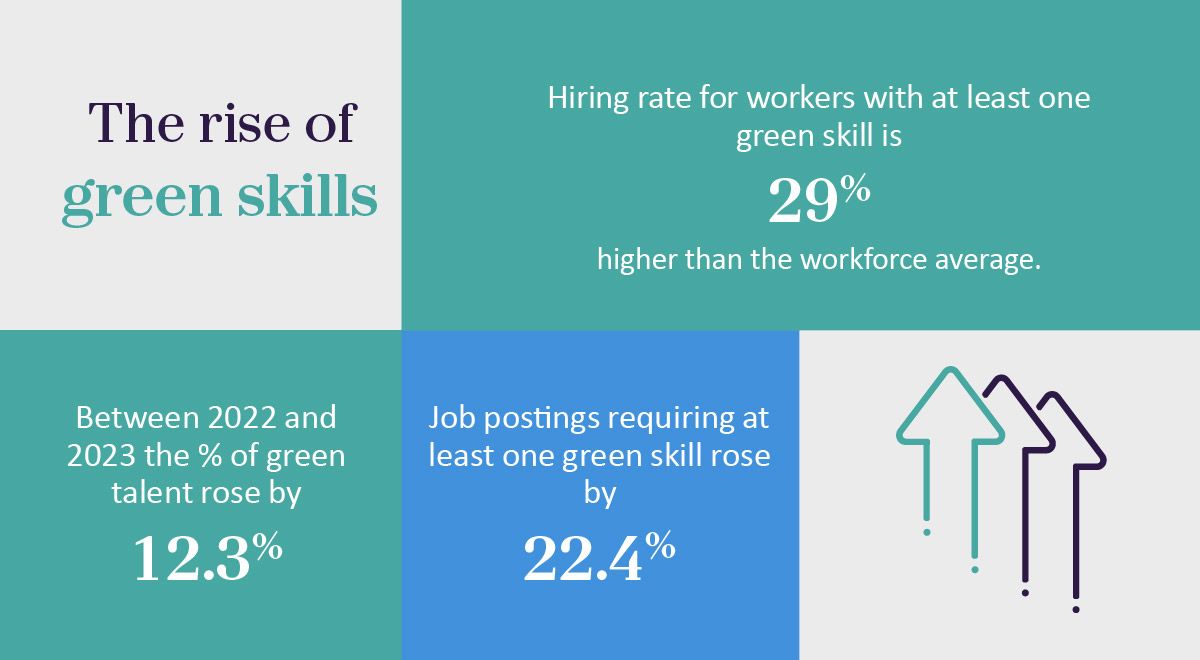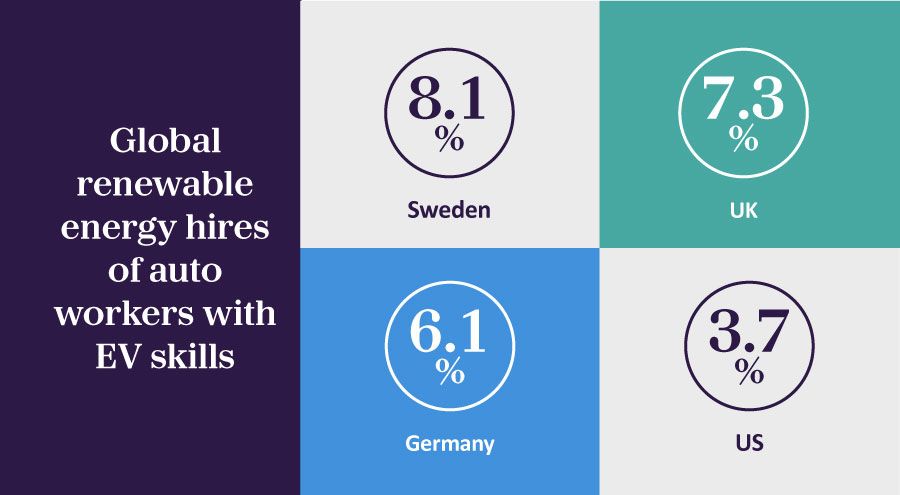Are we ready for the Green Skills Revolution?
Contributors:
Veronika Bougioukli
IO Psychologist, Bryq
David Ingleson
Sector Managing Director, AMS
Caitlin McGregor
CEO, Plum

It’s a wakeup call for the planet — and recruiters and TA leaders are searching for candidates with the right skills to help bring the Earth from the brink of destruction for the sake of future generations. Here’s how your team can play a crucial role in a global existential crisis.
The alarm clock is ringing.
At the United Nations COP28 World Climate Action Summit that took place in Dubai in December, politicians, business leaders and scientists heard a stark warning from the UN Secretary General.
“Excellencies,” UN General Secretary Antonio Gutteres told the gathered guests, “the climate challenge is not just another issue in your inbox. Protecting our climate is the world’s greatest test of leadership.”
It’s a great test for HR leaders, recruiters and the technology firms that provide them with solutions as well. In order to reduce greenhouse gas emissions caused by fossil fuels by 2030, forward-thinking talent acquisition leaders are actively seeking to hire a new breed of employee: People with green skills — in both white, gray and blue-collar fields — who can help companies fight emissions, create clean technologies and reduce carbon footprints inside and outside the workplace. But in order to reach these goals, TA teams and the vendors that supply them with their technology are adapting to the new hiring demands to attract these valuable workers.
Adapting to modern realities of the job market is part of the job for TA leaders, whether it’s hiring essential workers during a global pandemic, shifting employees from the office to remote work, meeting the needs of DEI mandates and mastering disruptive technologies like artificial intelligence. The recent focus on green skills is an off-shoot of the recent emphasis on employee skills, both hard and soft ones. Not long ago, recruiters looked at a candidate’s resume for their educational background and work experience and their skills almost always sat in the bottom of their CV. Not only have skills risen to the top of nearly everyone’s resumes, they are now front of mind for recruiters and hiring managers.
And the greener the skills, the better.
What are green skills? According to the UN Industrial Development Organization, this set of expertise and strengths encompass “the knowledge, abilities, values, and attitudes needed to live in, develop and support a sustainable and resource-efficient society.”
While this definition is a good start, David Ingleson, Sector Managing Director at AMS, believes that the modern definition of green skills should be broader as many roles in the current green economy are based on established skillsets but are still not seen as uniquely green skills.
“We need to demystify the whole idea of ‘green skills’ as being some kind of technical skillset that can only be achieved with a specialist Masters’ Degree in a scientific field,” says Ingleson.
The demand for green skills will only grow as more organizations, businesses, universities and other entities look for candidates with what Liam Neeson would call “a very particular set of skills.” Ingleson points out that “countless” organizations and nations have now signed commitments such as the Paris Agreement and the UN Sustainable Development Goals among others.
“Every large organization in the global economy that wants to be perceived as an attractive employer with a sustainable long-term future has committed to their own individually imposed targets of net-zero or net-neutral by a certain date in the future,” says Ingleson.
Green skills are not just for energy producers.
As little as a decade ago, it would have been safe to assume that primary businesses in need of green skills were limited to energy companies, but this notion has been shattered. Modern green skills are in demand in every sector of business, argues Ingleson. An exemplar in the consumer goods sector is Unilever (an AMS client) who are leading the way in decarbonizing their supply chains and focusing on sustainable product design in their business operations. Unilever’s aspiration to be a ‘net positive’ company is clear to see. Government and education sectors need more policy advisors, researchers, scientists, and environmental experts, and the financial services sector is also scrambling to keep track of sustainability-related reporting as they create and grow their portfolios. They also need to address the increased energy needs for recalculating investment positions for super-fast, sub-second trading manoeuvres and satisfying their power-hungry data server farms for their blockchain operations for cryptocurrency and other asset classes.
“In the digital and technology sector, we see the need to develop clean technology that is energy efficient, such as using data scientists to analyze complex data sets to see ways to reduce emissions,” adds Ingleson.
According to Veronika Bougioukli, IO Psychologist for TA solution provider and AMS Verified partner Bryq, marquis-name companies are pursuing green skills with enthusiasm and a sense of purpose.
“Consultancies like Deloitte have invested in upskilling their consultants in green skills, Ikea has trained over 20,000 food workers in technology which resulted in 50% cut in food waste, and Walmart has integrated green skills into its operations by hiring professionals with expertise in sustainable supply chain management, energy efficiency, and waste reduction,” she says.
As expected, leading technology firms are all aboard the green skills train, including Siemens Energy, Microsoft, Tesla, Baker Hughes, IBM, AXA among others. “Google has a workforce that includes professionals with green skills in data center efficiency, renewable energy procurement, and sustainable business practices,” adds Bougioukli.
Specific technical expertise varies across sectors. In the renewable energy sector, for example, specific technical expertise may include knowledge of solar panel installation and grid integration. Similarly, in eco-friendly construction, skills related to green building design, and sustainable materials are highly sought after.
“However, there is a universal pattern when it comes to sought-after soft skills,” says Bougioukli. “Recruiters and employers highly value critical thinking, problem-solving, design thinking, creativity, adaptability, empathy, and self-management skills like resilience.”


“Excellencies, the climate challenge is not just another issue in your inbox. Protecting our climate is the world’s greatest test of leadership.”

Where are the workers with green skills?
If employers are eager to hire workers with green skills, why are they facing hurdles in filling these urgent roles? LinkedIn has an idea. In its Global Green Skills Report 2023, the online job and professional networking site scoured its 930 million subscribers for data about the status of hiring for jobs that require green skills and the companies that are hiring for them. The verdict? Green skills may be in high demand but there aren’t nearly enough candidates with these skills looking for work.

Source: Global Green Skilling Report 2023, LinkedIn
The numbers are eye-opening. LinkedIn found that only one in eight workers have what recruiters would consider to be a green skill. Between 2022 and 2023, the percentage of green talent in the 48 countries that the online career site examined rose by 12.3% while the share of job postings requiring at least one green skill rose by 22.4%.
While overall hiring slowed globally between 2022 and 2023, job postings requiring at least one green skill increased 15.2% over the same timeframe. The hiring rate for workers with at least one green skill is 29% higher than the workforce average, and since March 2020, workers with green skills have been hired for new jobs at a higher rate than those without these same attributes in every single country examined for the report, LinkedIn says.
Speaking of different nations, from 2015 to 2023, the renewable energy industry hired new employees in every country studied by LinkedIn. As of last March, Sweden boasted the largest slice of auto workers with electric vehicle (EV) skills with 8.1% of workers, while the UK and Germany had the second and third largest percentage of workers with EV skills at 7.3% and 6.1% respectively. The U.S. trailed behind its European counterparts with only 3.7% of auto workers possessing EV skills.
And the green energy space is reasonably secure for employees that possess this expertise. LinkedIn found that for every 100 workers who left the global renewable energy sector, 120 joined to take their place.

Source: Global Green Skilling Report 2023, LinkedIn
Why is hiring candidates with green skills such a challenge? Typically, green jobs have a high bar for entry because they typically “require combinations of multiple green skills,” Efrem Bycer, Sr., Lead Manager, Public Policy & Economic Graph at LinkedIn said in an interview with Forbes. “Typically, 81% of workers who transition into green jobs have at least some green skills or prior green experience,” he added.
Given the emergence of many new green roles and the scarcity of candidates with direct experience in these positions, it’s crucial for recruiters to identify transferable skills to help them deepen their talent pool, advises Caitlin MacGregor, CEO of TA technology provider and AMS Verified partner Plum.
“You’re not going to find many applicants with 10, 15, 20 years of experience to fill every single role, but you’d be missing out on great people if you limited yourself in that regard,” she says. “By emphasizing soft skills such as innovation, communication, and execution, recruiters can screen-in a wider and more diverse pool of candidates who possess the aligned behaviors necessary to excel in these jobs.”
This is where an assessment platform, like the one Plum provided to clients such as Scotiabank, Whirlpool and others, can play a role. “Given that these competencies are challenging to identify in a consistent, non-biased way, assessment platforms like Plum enable you to gain insights beyond what is evident from a candidate's resume,” she says. “This enables a more holistic understanding of a candidate's potential to thrive in a green role while simultaneously ensuring a broad range of perspectives in these roles as well.”
Recruiters can effectively identify candidates with robust green skills during the hiring process by prioritizing objectivity, credibility, and fairness, recommends Bryq’s Bougioukli. “Structured interviews further enhance the identification of candidates with robust green skills during the hiring process,” she says. “This approach ensures a systematic evaluation of both technical proficiency in industry-specific green practices and essential soft skills like problem-solving and critical thinking.”
While up-to-date talent technology is needed in the pursuit of workers with green skills, recruiters need a different mindset when searching and assessing for these new skillsets. AMS’ Ingleson says recruiters ignore the transferability and adjacency of skills at their own risk. For example, he says that engineering problems are similar across many industries, and engineers are equipped with solving complicated engineering problems in whatever industry they might be.
“Analysis of data and critical thinking are skills that can be transferred across many different data-sets and it may just be that it is green data that needs to be analyzed,” he says. Machinery and infrastructure will need to be operated and maintained in the coming years, but it may simply be part of what Ingleson calls a “green infrastructure.” Likewise, leadership skills are “highly transferable” across any industry and can be applied to the green economy.
“It is therefore crucially important that recruiters and hiring managers keep an open mind as to what skills are genuinely needed to operate in a given environment,” says Ingleson.
TA and HR leaders also need to embrace candidate and employee training if they are desperate to fill new ranks of green jobs. TA models like “recruit, train, deploy” could be a highly effective route for green skills hiring, offering a comprehensive approach to address the increasing demand for workers with expertise in sustainable practices and environmental conservation, according to Anna Crowe, Client Operations Director for AMS.
“Such a model can Identify individuals from diverse backgrounds who have the potential and interest in acquiring green skills and design training programs that are tailored to the specific needs of the green economy,” she says.
DEI on the road to being green
The experts we interviewed agree that one of the most exciting aspects of the green skills revolution is the building up of the green collar workforce.
“We have the chance to start from a near blank piece of paper and build a diverse workforce in the green economy, rather than recycling the same non-diverse group of people,” says Ingleson.
“This is where the change of mindset is really important. If we embrace a diversity-led approach to attracting talent into the green economy, we can bring whole new diverse categories of talent into the sector to help accelerate the energy transition,” he says.
The green economy is proving to be an attractive destination for more diverse talent. Renewables-focused university courses attract nearly twice as many more women than pure engineering courses, with around half (48.5%) of students in the renewables-focused courses being women, compared to just 24.9% of students in the pure engineering courses.
“There needs to be a concerted effort to promote the purpose-led careers available in the green economy. Working practices, remuneration and reward also need to be positioned to ensure all talent consider a career in the sector,” says Ingleson. “Recruiters will play an important role in bringing these aspects to life.”
Ingleson isn’t done with DEI’s role in green skills just yet. “Ongoing investments in green skills development contribute to social fairness and inclusivity,” he says. “By actively promoting training and educational opportunities for underrepresented groups, recruiters can play a proactive role in creating a workforce that reflects diverse perspectives in environmental sustainability roles.”
Despite these dire warnings and signs that governments and industry have put off action against climate change for too long, the UN Secretary General rang a note of hope for the future at the COP28 World Climate Action Summit and the key role that technologists can play in this cause.
“We have the technologies to avoid the worst of climate chaos,” he told the assembled dignitaries, “if we act now.”
written by Phil Albinus and reviewed by the Catalyst Editorial Board
with contribution from:

Veronika Bougioukli
IO Psychologist, Bryq
David Ingleson
Sector Managing Director, AMS
Caitlin McGregor
CEO, Plum
